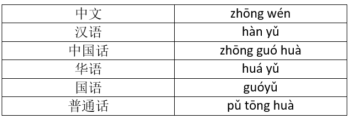Chinese Vocabulary for Learning Languages Part 1 Posted by Ayana on Jul 27, 2021 in Vocabulary
According to the Ethnologue (published by SIL International), there are over 7,000 living languages worldwide:
现在全球有超过7,000种不同的语言。
Xiàn zài quán qiú yǒu chāo guò 7,000 zhǒng bù tóng de yǔyán.
Nowadays, there are more than 7,000 different languages in the world.

The Chinese word for language is 语言 (yǔ yán). It refers to any language. For example:
一个国家可能有几种地方语言。
Yī gè guó jiā kě néng yǒu jǐ zhòng dì fāng yǔ yán.
One country may have several local languages.
语言是交际的工具。
Yǔ yán shì jiāo jì de gong jù.
Language is a tool of communication.
你会说什么语言?
Nǐ huì shuō shén me yǔ yán?
What language can you speak?
我会说三种 语言。
Wǒ huì shuō sān zhǒng yǔ yán.
I can speak three languages.
加拿大人说什么语言?
Jiā ná dà rén shuō shén me yǔ yán?
What language do Canadians speak?
When talking about a specific language, the character 语 (yǔ, first in the above phrase 语言) will usually follow the name of the language. For example:
- English = 英语 (yīng yǔ)
- Russian = 俄语 (è yǔ)
- French = 法语 (fǎ yǔ)
- Italian = 意大利语 (yì dà lì yǔ)
- German = 德语 (dé yǔ)
- Japanese = 日语 (rì yǔ)
- Korean = 韩语 (hán yǔ)
- Spanish = 西班牙语 (xībān yá yǔ)
- Portuguese = 葡萄牙语 (pú táo yá yǔ)
- Arabic = 阿拉伯语 (ā lā bó yǔ)
- Hebrew = 希伯来语 (xī bó lái yǔ)
For the Chinese language there are quite a few names in Chinese:


说 (shuō), as mentioned in the examples above, is usually used when referring to a language. 说 means to speak, to talk. It is followed by the language the speaker is speaking right now, or in general:
他在说英语。
Tā zài shuō yīng yǔ.
He is speaking English.
俄罗斯人说俄语。
È luó sī rén shuō è yǔ.
Russians speak Russian.
Another verb refers to languages is 讲 (jiǎng), meaning to speak. For example:
我希望有一天会讲流利的法语。
Wǒ xī wàng yǒu yī tiān huì jiǎng liú lì de fǎ yǔ.
I hope to speak fluent French one day.
国外留学半年多了,还总是不能自信的讲西班牙语。
Guó wài liú xué bàn nián duō le, hái zǒng shì bù néng zì xìn de jiǎng xī bān yá yǔ.
I have been studying abroad for more than half a year, and I still can’t speak Spanish confidently.

There are more verbs referring to a language – verbs that indicate not only the ability to speak a language, but also to speak it fluently. 通晓 (tōng xiǎo) means to have a good knowledge of. 掌握 (zhǎng wò) means to master, to know well. For example:
他通晓多种语言。
Tā tōng xiǎo duō zhǒng yǔ yán.
He is multilingual.
这位华侨掌握日语。
Zhè wèi huá qiáo zhǎng wò rì yǔ.
This overseas Chinese masters Japanese.
好好学习,天天向上!

Build vocabulary, practice pronunciation, and more with Transparent Language Online. Available anytime, anywhere, on any device.





Leave a comment: